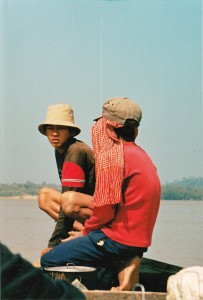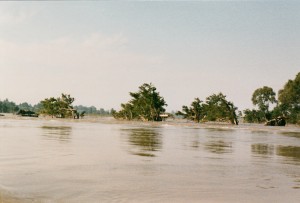[In January 2003 I accompanied an expedition that was conducting a survey of river dolphins on a stretch of the Mekong River in Cambodia. The expedition was led by Isabel Beasley, who was then a PhD student specializing on Orcaella brevirostris: also known as the ‘Irrawaddy Dolphin’ this species is found in many Asian river systems and deltas. The journal I kept during the expedition will appear on this site as a continuous series of posts. This is part 24 of the series.]
 Most women field biologists, Isabel says, take it more or less for granted that they will not marry or have children or indeed, any kind of domestic life (although there are a few exceptions, like her own research supervisor, Prof. Helene Marsh). Isabel was once on a dolphin surveying expedition in the Pacific, and the majority of the scientists were women, in the 30-35 age-group. Almost none were married; very few even had serious relationships. ‘Women know they can’t have careers (in field biology) as well as families.’ No one would give contracts to people who would have to absent themselves regularly in order to be with their families. Equally, if a woman took two or three years off she would find it very hard to come back into the field. For one thing she would have fallen behind in her network of contacts; for another younger people would have come along and squeezed her out. In a way it’s a very competitive field – like any other, investment banking, publishing, whatever.
Most women field biologists, Isabel says, take it more or less for granted that they will not marry or have children or indeed, any kind of domestic life (although there are a few exceptions, like her own research supervisor, Prof. Helene Marsh). Isabel was once on a dolphin surveying expedition in the Pacific, and the majority of the scientists were women, in the 30-35 age-group. Almost none were married; very few even had serious relationships. ‘Women know they can’t have careers (in field biology) as well as families.’ No one would give contracts to people who would have to absent themselves regularly in order to be with their families. Equally, if a woman took two or three years off she would find it very hard to come back into the field. For one thing she would have fallen behind in her network of contacts; for another younger people would have come along and squeezed her out. In a way it’s a very competitive field – like any other, investment banking, publishing, whatever.
‘But I don’t know,’ said Isabel, ‘how I’ll feel when my biological clock starts running out.’ To me it seems very ironic thhat field biologists should lead lives that are so completely at odds with the biology of their own species.
Does there still exist, I asked, a group scientists who would describe themselves as ‘naturalists’? A few, she said. She named one whose knowledge of the natural world of South-East Asia is so detailed and thorough that people refer to him as a ‘naturalist’ – but his specialization is birds. Then there was another man, who is in North Korea. He’s been lucky to be allowed to study birds in North Korea, but he’s always followed by watchers. He has no friends, no visitors, and that’s how he likes it – visitors would be a distraction.
I asked Isabel if she knew about trees and she shook her head ruefully; no, she doesn’t and doesn’t particularly want to. ‘Just want to keep what I’ve got in my head’. On another occasion she told me that she couldn’t conceive of doing terrestrial zoology because she hates insects and mud.

